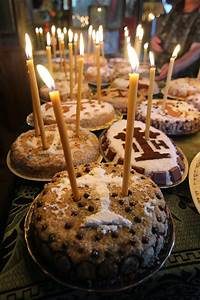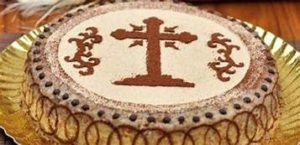 In the autumn of 2006, I moved to Romania to pursue a master’s degree at Babes-Bolyai University and I had a roommate named Danny who used to bring back all kinds of delicious traditional foods from his home town. One time he returned with something that looked like a cross between pudding and porridge, made from a base of cooked wheat mixed with raisins and nuts and ornately decorated with dried coconut, cocoa powder, bits of chocolate and candy. It tasted delicious, a bit like the Indian pudding of New England cuisine. I asked Danny what it was and he said it was called “coliva” and it had been blessed at the church. Immediately I was curious and began to do research and learned of the fascinating tradition of preparing and blessing coliva at memorials for the dead and on various saints’ days in Eastern Orthodox countries. Since the ritual use of foods is of great interest to me, I have decided to share a little today about the tradition of coliva and how it can be made in honor of loved ones on the other side and in celebration of the saints.
In the autumn of 2006, I moved to Romania to pursue a master’s degree at Babes-Bolyai University and I had a roommate named Danny who used to bring back all kinds of delicious traditional foods from his home town. One time he returned with something that looked like a cross between pudding and porridge, made from a base of cooked wheat mixed with raisins and nuts and ornately decorated with dried coconut, cocoa powder, bits of chocolate and candy. It tasted delicious, a bit like the Indian pudding of New England cuisine. I asked Danny what it was and he said it was called “coliva” and it had been blessed at the church. Immediately I was curious and began to do research and learned of the fascinating tradition of preparing and blessing coliva at memorials for the dead and on various saints’ days in Eastern Orthodox countries. Since the ritual use of foods is of great interest to me, I have decided to share a little today about the tradition of coliva and how it can be made in honor of loved ones on the other side and in celebration of the saints.
 Coliva is made and blessed at funerals and during memorial services on the third, ninth and fortieth days after the death of an Orthodox Christian. The faithful will often stand around eating the coliva and talking about the departed loved one and saying “May God forgive him or her.” It is also customary to eat coliva on various days set aside in the Orthodox Church calendar to commemorate all the dead known as Soul Saturdays and also on Radonitsa, a day dedicated to the souls of all the departed, which falls on the second Tuesday after Easter. The origin of coliva as a ritual food comes from a line in the Gospel of John in which wheat grains are presented as a symbol of eternal life. Verily, verily, I say unto you, Except a grain of wheat fall into the ground and die, it abideth alone: but if it die, it bringeth forth much fruit. (John 12:24). Eating coliva in memory of a love one serves as a reminder to faithful Orthodox Christians that we all have the promise of eternal life and we will be reunited with our loved ones again in Heaven.
Coliva is made and blessed at funerals and during memorial services on the third, ninth and fortieth days after the death of an Orthodox Christian. The faithful will often stand around eating the coliva and talking about the departed loved one and saying “May God forgive him or her.” It is also customary to eat coliva on various days set aside in the Orthodox Church calendar to commemorate all the dead known as Soul Saturdays and also on Radonitsa, a day dedicated to the souls of all the departed, which falls on the second Tuesday after Easter. The origin of coliva as a ritual food comes from a line in the Gospel of John in which wheat grains are presented as a symbol of eternal life. Verily, verily, I say unto you, Except a grain of wheat fall into the ground and die, it abideth alone: but if it die, it bringeth forth much fruit. (John 12:24). Eating coliva in memory of a love one serves as a reminder to faithful Orthodox Christians that we all have the promise of eternal life and we will be reunited with our loved ones again in Heaven.
 Coliva is also prepared on various saints’ days throughout the year. Most notably it is associated with Theodore Saturday which falls on the first Saturday of Lent. According to church tradition, during the reign of Julian the Apostate, the pagan emperor knew that Christians would be hungry after a week of fasting and ordered that blood from animals sacrificed to pagan gods be sprinkled all over the vegetables in the marketplace to make them unclean and thereby forbidden for Christians to eat. St. Theodore Tyro appeared in a dream to Archbishop Eudoxius and warmed him about the emperor’s wicked plot and instructed the faithful to eat only boiled grains sweetened in honey. In commemoration of this event, Orthodox Christians still eat coliva on the first Saturday of Lent. In Lebanon, a dish similar to coliva called burbara is made on the 4th of December which is the feast of St. Barbara. According to legend, one day Saint Barbara was fleeing from her abusive father and she ran through a wheat field and the wheat miraculously grew several inches to cover her tracks so that she could evade capture. Middle Eastern Christians commemorate this miracle with the making and blessing of the wheat based burbara on her feast day. In addition to eating burbara, children often dress in costumes and go door to door seeking treats in a tradition similar to the western practice of trick or treating on Halloween. I absolutely love this tradition since St. Barbara is one of my most beloved saints and Halloween is my favorite holiday.
Coliva is also prepared on various saints’ days throughout the year. Most notably it is associated with Theodore Saturday which falls on the first Saturday of Lent. According to church tradition, during the reign of Julian the Apostate, the pagan emperor knew that Christians would be hungry after a week of fasting and ordered that blood from animals sacrificed to pagan gods be sprinkled all over the vegetables in the marketplace to make them unclean and thereby forbidden for Christians to eat. St. Theodore Tyro appeared in a dream to Archbishop Eudoxius and warmed him about the emperor’s wicked plot and instructed the faithful to eat only boiled grains sweetened in honey. In commemoration of this event, Orthodox Christians still eat coliva on the first Saturday of Lent. In Lebanon, a dish similar to coliva called burbara is made on the 4th of December which is the feast of St. Barbara. According to legend, one day Saint Barbara was fleeing from her abusive father and she ran through a wheat field and the wheat miraculously grew several inches to cover her tracks so that she could evade capture. Middle Eastern Christians commemorate this miracle with the making and blessing of the wheat based burbara on her feast day. In addition to eating burbara, children often dress in costumes and go door to door seeking treats in a tradition similar to the western practice of trick or treating on Halloween. I absolutely love this tradition since St. Barbara is one of my most beloved saints and Halloween is my favorite holiday.
In addition to having deep spiritual connotations, I find coliva to have a unique and delicious taste. If you decide to make it one day, you could think of your loved ones on the other side and pray for them while you prepare and eat the coliva and let this sweet dish which is a symbol of immorality and resurrection serve as a reminder that our departed loved ones are very much alive in another place and we will see them again one day.
I hope you have enjoyed this post and I thank you for taking the time to visit the blog. As always I wish you peace, happiness and abundant blessings!